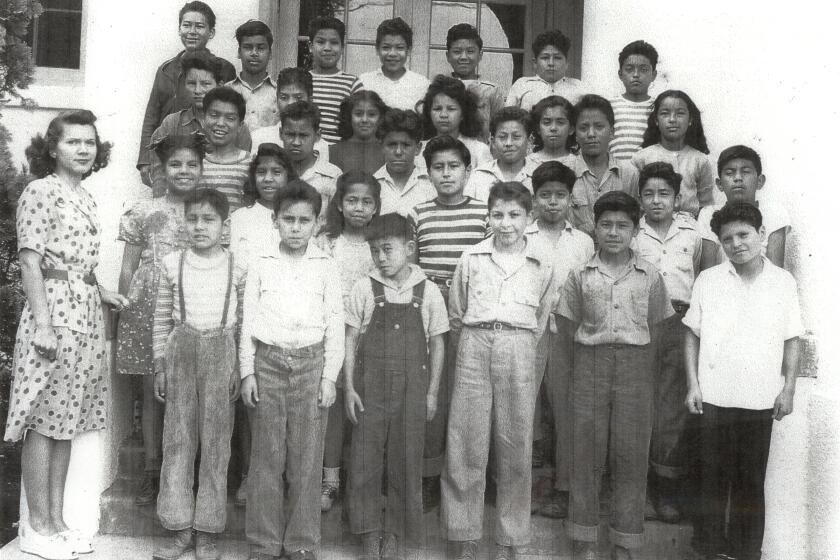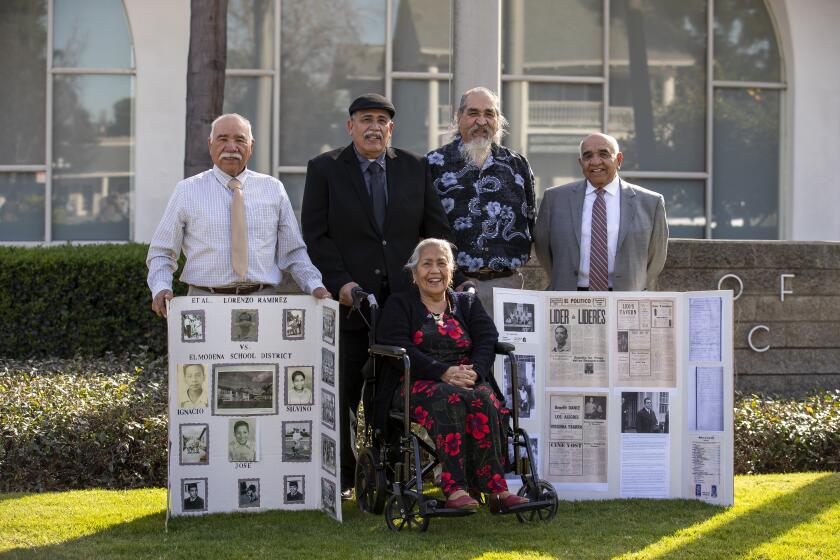Newsom signs bill adding key O.C. civil rights case to state’s history textbooks

Lessons about a landmark court case in Orange County that led to school desegregation in California will now be taught in the state’s public schools.
On Sept. 20, Gov. Gavin Newsom signed AB 1805, a bill requiring Mendez, et al v. Westminster School District of Orange County, et al be included in the state’s history and social science curriculum standards.
Starting on Jan. 1, the law directs a state commission to consider adopting new instructional materials on the landmark case to be taught in classes.
Sylvia Mendez, who integrated the formerly all-white 17th Street School in Westminster as a student after the civil rights trial, applauded the move.
“I’m so happy that the governor signed the bill,” she said. “The Mendez family has been working for this for over 20 years. It’s been a long struggle for everybody who has helped, and we’ve finally completed our task.”
An appellate court upheld a ruling against Mexican schools 75 years ago. The pandemic roots of school segregation in Santa Ana remain forgotten.
Though lesser known, the Mendez case predated the U.S. Supreme Court decision in Oliver Brown, et al v. Board of Education of Topeka, et al, which struck down school segregation in 1954 across the nation.
In the fight for an equal education, five Mexican American fathers filed a federal lawsuit in 1945 against school districts in Westminster, Santa Ana, Garden Grove and El Modena, an unincorporated area in Orange, that segregated Mexican children for decades.
Gonzalo Mendez, Sylvia’s father, served as the lead plaintiff, after she and her brothers, Gonzalo, Jr. and Jerome, were barred from attending 17th Street School in Westminster and had to enroll at Hoover School, a segregated Mexican schoolhouse, instead.
The class-action suit represented 5,000 segregated Mexican pupils.
After a two-week bench trial in 1946, Judge Paul McCormick ruled in favor of the plaintiffs, a decision upheld by an appellate court the following year.
Two months after the appellate court’s decision, California Gov. Earl Warren, who later served as Chief Justice of the Supreme Court during the Brown case, signed a bill into law that repealed remaining codes that allowed for school segregation, which made California the first in the nation to do so.

Inspired by the case’s impact, a pair of O.C. lawmakers, Assemblyman Tri Ta (R-Westminster), and state Sen. Tom Umberg (D-Santa Ana) both represent cities central to the case and co-authored the bill requiring its statewide instruction.
“Future generations will learn about the case and understand that this is America where we will stand up for civil rights,” said Ta. “Students will benefit from that.”
Ta formerly served as Westminster’s mayor when he and the Westminster City Council voted to create the Mendez Freedom Trail and Monument in 2017.
Umberg helped secure $1.5 million in state funding for the project and teamed with Ta on the new law, making it a bipartisan effort.
“It does demonstrate that we’ve come to a place where we share values,” Umberg said. “I’m proud of the fact that we’ve done this in a bipartisan and bicameral way.”
The bill also enjoyed the support of a wide array of groups including the California Hispanic Chamber of Commerce, California Charter Schools Assn., California State PTA and California Federation of Teachers.

For Mendez, the legislative victory comes 16 years after Gov. Arnold Schwarzenegger vetoed a similar bill in 2008. At the time, he cited that the state should refrain from “being overly prescriptive” in mandating specific lessons.
Mendez and her sister, Sandra Mendez Duran, traveled to Sacramento this year to rally support for the bill’s passage.
Its text states that the case marked the “beginning of the end of legal school segregation and signifies the important role of California in the civil rights movement, a role that should be both preserved and remembered.”
The Orange City Council has issued posthumous proclamation celebrating the Mexican activist’s participation in Mendez, et al v. Westminster, et al.
The new law brings the history of the Mendez case full circle.
Mendez Duran attended U.C. Riverside as a student in 1969 when she stumbled across her parents’ place in history for the first time when reading Carey McWilliams’ “North from Mexico,” a classic survey of Chicano history first published in 1949.
She called her mother, Felicitas, who was shocked that a book recounted the case.
“My parents used all their resources to fight the case and returned to Santa Ana with pretty much nothing,” Mendez Duran said. “It was a little bit difficult for them.”
Before Felicitas passed away in 1998, she told her children that she wanted the history of the case to be known.
“It became my legacy from that day on,” Mendez said. “It was such an important case for everyone, not only for Latinos. My mother would be so happy that her request has finally been fulfilled.”
All the latest on Orange County from Orange County.
Get our free TimesOC newsletter.
You may occasionally receive promotional content from the Daily Pilot.






